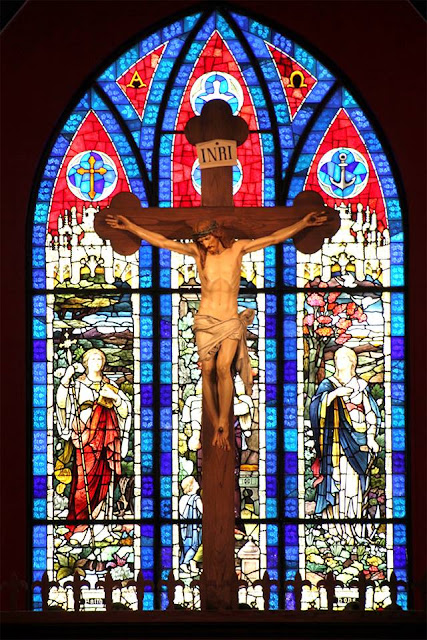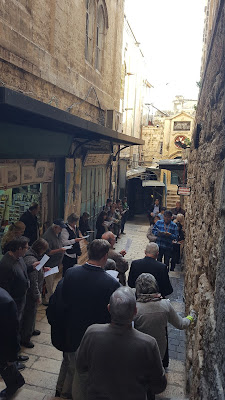With the lives of so many early martyrs shrouded in legend, we are fortunate to have the record of the courage of Perpetua and Felicity from the hand of Perpetua herself, her teacher Saturus, and others who knew them. This account, known as "The Martyrdom of Perpetua and Felicity," was so popular in the early centuries that it was read during liturgies.
In the year 203, Vibia Perpetua made the decision to become a Christian, although she knew it could mean her death during Septimus' persecution. Her surviving brother (another brother had died when he was seven) followed her leadership and became a catechumen as well.
Her father was frantic with worry and tried to talk her out of her decision. We can easily understand his concern. At 22 years old, this well-educated, high-spirited woman had every reason to want to live -- including a baby son who was still nursing. We know she was married, but since her husband is never mentioned, many historians assume she was a widow.
Perpetua's answer was simple and clear. Pointing to a water jug, she asked her father, "See that pot lying there? Can you call it by any other name than what it is?" Her father answered, "Of course not." Perpetua responded, "Neither can I call myself by any other name than what I am -- a Christian."
This answer so upset her father that he attacked her. Perpetua reports that after that incident she was glad to be separated from him for a few days -- even though that separation was the result of her arrest and imprisonment. Perpetua was arrested with four other catechumens including two slaves, Felicity and Revocatus, along with Saturninus and Secundulus. Their catechist, Saturus, had already been imprisoned before them.
She was baptized before taken to prison. Perpetua was known for her gift of "the Lord's speech" and receiving messages from God. She tells us that at the time of her baptism she was told to pray for nothing but endurance in the face of her trials.
The prison was so crowded with people that the heat was suffocating. There was no light anywhere and Perpetua "had never known such darkness." The soldiers who arrested and guarded them pushed and shoved them without any concern. Perpetua had no trouble admitting she was very afraid, but in the midst of all this horror her most excruciating pain came from being separated from her baby.
The young slave, Felicity was even worse off, not only suffering from the stifling heat, overcrowding, and rough handling, but she was eight months pregnant.
Two deacons who ministered to the prisoners paid the guards so that the martyrs would be put in a better part of the prison. There her mother and brother were able to visit Perpetua and bring her baby to her. When she received permission for her baby to stay with her, she said "my prison suddenly became a palace for me." Once more her father came to her, begging her to give in, kissing her hands, and throwing himself at her feet. She told him, "We live not in our own power but in the power of God."
Meanwhile Felicity was also in torment. It was against the law for pregnant women to be executed. To kill a child in the womb was shedding innocent and sacred blood. Felicity was afraid that she would not give birth before the day set for their martyrdom and her companions would go on their journey without her. Her friends also didn't want to leave so "good a comrade" behind.
Two days before the execution, Felicity went into a painful labor. The guards made fun of her, insulting her by saying, "If you think you suffer now, how will you stand it when you face the wild beasts?" Felicity answered them calmly, "Now I'm the one who is suffering, but in the arena there will be Another with me, suffering for me, because I will be suffering for him." She gave birth to a healthy girl who was adopted and raised by one of the Christian women of Carthage.
There was a feast the day before the games so that the crowd could see the martyrs and make fun of them. But the martyrs turned this all around by laughing at the crowd for not being Christians and exhorting them to follow their example.
The four new Christians and their teacher went to the arena (the fifth, Secundulus, had died in prison) with joy and calm. Perpetua in usual high spirits met the eyes of everyone along the way. We are told she walked with "shining steps as the true spouse of Christ, the darling of God."
When those at the arena tried to force Perpetua and the rest to dress in robes dedicated to their gods, Perpetua challenged her executioners. "We came to die out of our own free will so we wouldn't lose our freedom to worship our God. We gave you our lives so that we wouldn't have to worship your gods." She and the others were allowed to keep their clothes.
The men were attacked by bears, leopards, and wild boars. The women were stripped to face a rabid heifer. When the crowd, however, saw the two young women, one of whom had obviously just given birth, they were horrified and the women were removed and clothed again. Perpetua and Felicity were thrown back into the arena so roughly that they were bruised and hurt. Perpetua, though confused and distracted, still was thinking of others and went to help Felicity up. The two of them stood side by side as all five martyrs had their throats cut.
Perpetua's last words were to her brother: "Stand fast in the faith and love one another."
O Holy God, who gavest great courage to Saints Perpetua, Felicitas and their Companions: grant that, through their prayers, we may be worthy to climb the ladder of sacrifice, and be received into the garden of peace; through Jesus Christ thy Son our Lord, who liveth and reigneth with thee, in the unity of the Holy Spirit, ever one God, world without end. Amen.




















